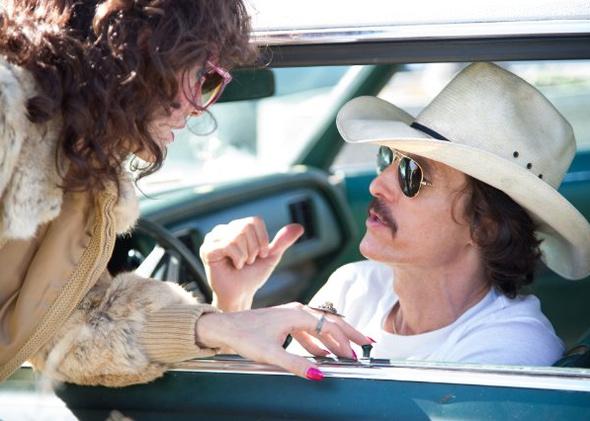Dear Trio,
I like awards! That’s no secret, but still, saying it to the three of you makes me feel like Stella Dallas, vulgarly swinging my loose hips and clanking costume jewelry across the veranda as people of good taste smile politely, then look away with sorrow. I like the Academy Awards, just as I like, for instance, the New York Film Critics Circle Awards, because I look to them as fascinating collective expressions of taste just as I look to your writing for engaging and challenging individual expressions of taste. If I don’t care about the individuals, I can’t care about the collective (which is why, for instance, the Golden Globes do nothing for me), but I do respect enough members of the academy to retain real interest in how their predilections announce themselves when they’re intermingled in any given year.
My highly scientific analysis of what happened with the nominations this morning is this: Those guys like stuff you don’t like and vice versa. Whatever and whoever else they are, academy voters are not critics—and that, I think, explains more than anything the disappointingly poor showing of Inside Llewyn Davis, which was recognized only for its sound mixing and cinematography. (We can stipulate right now, can’t we, that a good movie always outlives the transient verdict conferred by any prizes? Sadness lasts a day or two, and this much-admired film’s underperformance will only burnish its reputation.)
To my eyes the Coens’ latest is an almost perfect movie for critics in that it is, in some ways, a movie about one. The title character is a guy who is, among other things, so extraordinarily proud of his discerning taste that he sometimes confuses it with his actual talent. He looks at the world, and at his fellow artists, through the prism of his own carefully curated standards, and he seems brought up short over and over by the fact that everyone else does not see what he sees (or, more accurately, hear what he hears). Although the movie is a period piece, Llewyn is the perfect hero for a Twitter-driven age in which “It is incomprehensible to me that anyone who isn’t completely delusional could like [or dislike] this movie” seems to be everybody’s opening, shut-down-the-debate gambit. As one of your colleagues, Glenn Kenny, said to me—and I was persuaded by his take—the scene in which everyone in the club starts singing along to “500 Miles” and Llewyn looks around as if to say, “Is it just me or—wait, you’re singing along to this?! Man, I guess it is just me” is the bemused and lonely heart of the movie.
None of that is intended as a criticism of this thoughtful, mordant, hermetic piece of work, just as an observation that it hits the critic demographic (as opposed to the academy or audience demographic) right where it lives. Which isn’t where Oscar voters live. I’m not inclined to complain much this year, because voters clearly sorted through a lot of movies and spread the love around a bit. I know that you all feel passionate about at least a few films in the race. I was particularly happy about the nominations for American Hustle, Her, and Nebraska, as well as about the recognition of Before Midnight’s superb screenplay, and I will learn to live with the fact that Oprah got robbed—which is not to say snubbed, a silly word that I don’t believe correlates with any way that people think or vote. However, I will echo one already-well-aired gripe: No nomination for Stories We Tell? What the hell is wrong with these people?
With that said, let me now do something I never do, which is to stop talking about the Oscars and change the subject. Andrew, you’re one of our most thoughtful politically minded critics, and I always appreciate the degree to which you investigate the way real-world ideologies course along, or sometimes just beneath, the surface of popular movies. So I’m frustrated that we see Captain Phillips so differently, since to my eyes it was anything but a triumphalist veneration of American imperialism or military might. Like Kathryn Bigelow, Paul Greengrass is a director who is sometimes more interested in explaining exactly what is happening, and how, than in looking at why it’s happening. But I felt that in Captain Phillips, he and Billy Ray rather unobtrusively contextualized the events against a quickly sketched backdrop of vast economic inequity and an immense imbalance of power.
I would not have been particularly interested in, or convinced by, a version of this movie the point of which was that Captain Phillips had it coming. But since you’ve argued eloquently that, in the case of The Wolf of Wall Street, depiction is not endorsement, mightn’t it be said that lack of explicit textual condemnation does not constitute endorsement either? And if you see Captain Phillips as tilting infuriatingly to the right and I see it as tilting in a modest but sufficient way to the left, does that mean the movie’s wishy-washy, or that our positions are overdetermined?
Finally, when we treat politics as the entire text of a movie, are we doing the movie an injustice? I pose that last question seriously; just as you say you couldn’t get past what you felt Captain Phillips was saying, I felt myself so alienated by the spurious and somewhat pandering version of gay history offered in another of today’s Best Picture nominees, Dallas Buyers Club, that the movie’s virtues seemed as distant to me as if I were viewing them through the wrong end of a telescope. My fault, or the movie’s?
Onward, but to where?
Mark
